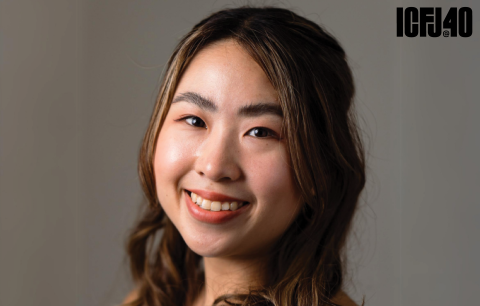
Beatrice Lauren Go is the Founder & CEO of Atleta Filipina, a startup that features Filipino women in sports. She is also a freelance journalist and researcher based in Manila. She covers local and international sports, but is now focusing on women in sports.
Go’s experience with ICFJ led to her launching her own media platform, a highly unique outlet that draws on her own expertise and interests.
This interview has been edited slightly.
How have you been involved with ICFJ over the years?
I have been involved with ICFJ since 2023 when I joined the News Corp Media Fellowship program. I was one of the five early-career journalists who received reporting grants, where I covered girls’ participation in sports in the Philippines and how it affects women empowerment in the country. The article “Let Her Play” was published in GMA, the Philippines’ biggest broadcast network.
I traveled to different provinces in the Philippines to interview both government and private girls’ sports programs, and collected insights of local women’s sports supporters through a survey. Through the data journalism and communication engagement methods taught to me by the ICFJ program and my mentor, Tom Meagher, I was able to identify the challenges and values of girls’ participation in sports, which can transform lives and help build a nation.
What was the biggest outcome from participating in the program?
The biggest outcome from participating in the program is being able to launch my own startup, Atleta Filipina, a platform for Filipino women in sports. The first of its kind in the Philippines, Atleta Filipina aims to serve the needs of the country’s women’s sports community. The company provides media coverage to increase the demand for women’s sports content and stages events with a goal of getting women and girls into sports.
What is something impactful you have worked on since participating in an ICFJ program that you are proud of and would want to highlight? Was your experience with ICFJ helpful in some way for this?
Within its first three months, Atleta Filipina has proven that there is a demand for women’s sports. The brand is close to reaching 1,000 followers on Instagram and has produced short-form videos that have gone viral on social media. We have also helped get girls into sports by staging a sold-out Intro to Padel course that gave a platform to a female coach leading the clinic. Atleta Filipina has developed partnerships with various sports organizations who are aligned in paving the way for women to have a future in sports.
The ICFJ News Corp Media Fellowship program has given me the opportunity to expand my network and to further discover the needs of female athletes and teams nationwide through the reporting project.
Why is it so important right now to provide the kind of support to journalists that ICFJ does, especially in Southeast Asia?
It is important to provide this kind of support to journalists in Southeast Asia because the region has always struggled with accepting and enforcing global ideas. It gives a bigger platform for journalists who want to serve and inspire their respective nations.
What are you currently working on that you’re excited about?
Atleta Filipina is currently working on its campaign and executions for the Paris 2024 Olympics. We are also holding a mobile journalism and content creation workshop during the Philippines’ hosting of the Volleyball Nations League in June 2024 together with ABC Australia’s Women In News and Sports (WINS) Initiative. Aspiring journalists from different regions will be given a chance to learn the latest tips and tricks of multimedia coverage and will be given a chance to apply their learnings in the tournament.
What kind of difficulties as a journalist have you faced in the Philippines?
Security and safety have always been my biggest challenges as a journalist in the Philippines. I was “red-tagged” and I have experienced online identity theft because of the work that I have been doing. There’s also a lack of safe spaces in the country’s media scene and as a woman journalist, I have experienced discrimination and harassment from sources and colleagues.
Why did you choose to become a journalist? What drew you to sports journalism?
I chose to become a journalist because the opportunity was presented to me after my stint as the sports editor of my university’s official publication. I had a background in sports as a former competitive swimmer, which helped me connect to the athletes I cover. I found joy in using my abilities to serve our athletes and teams by covering their stories and giving them a platform.
What’s one piece of advice you’d give to an aspiring journalist?
My advice would be to have a heart of service in this profession. Being a journalist is about understanding and serving your audience and asking yourself how the information we have can impact them. From this, I am able to be bold and not afraid to chase after stories that matter.